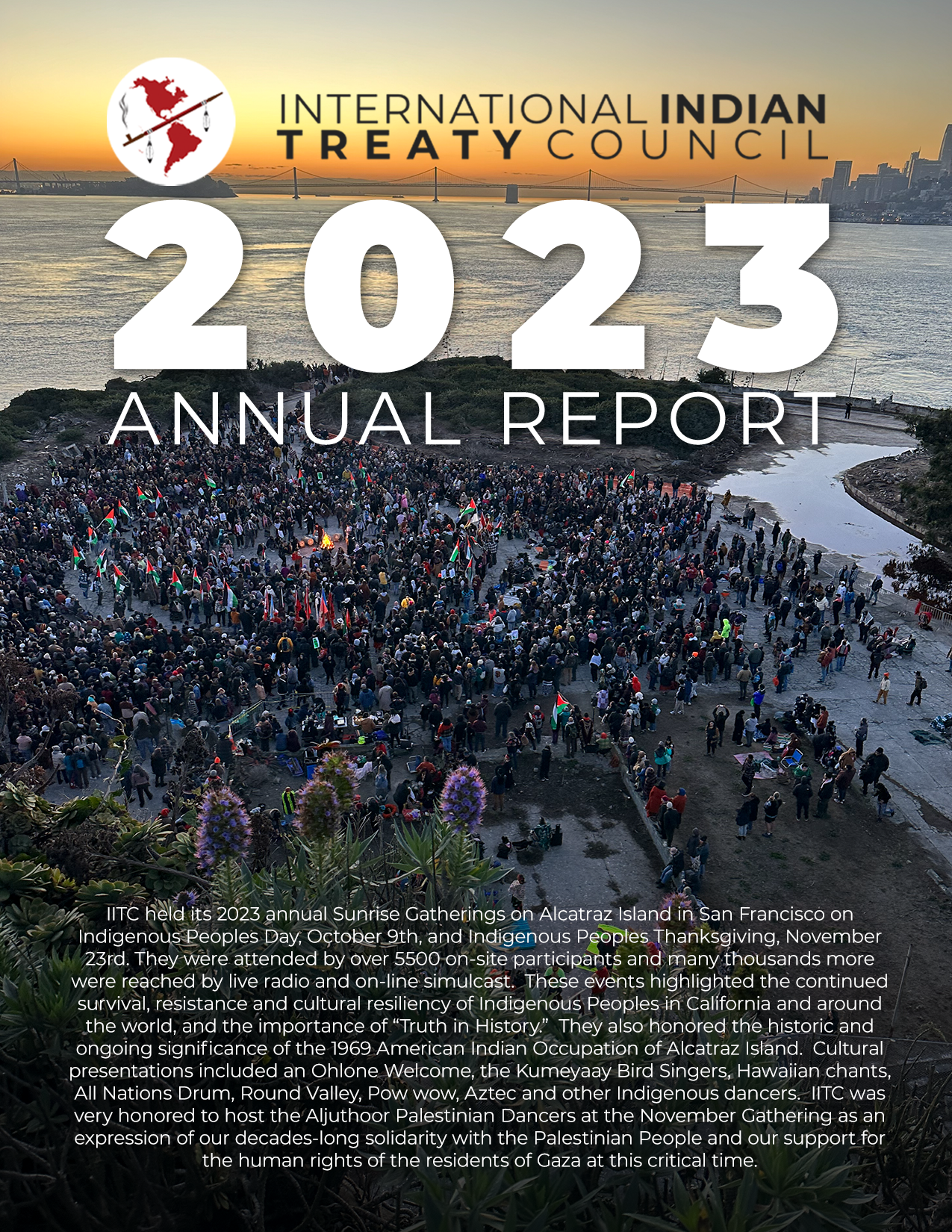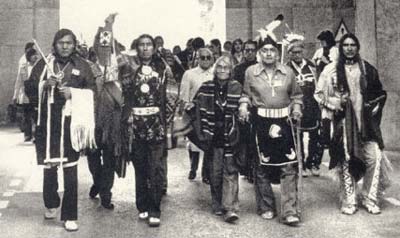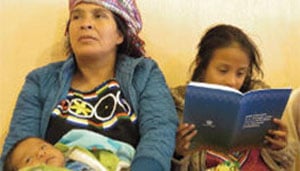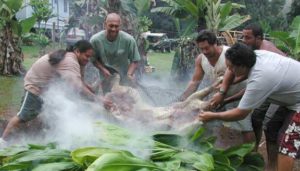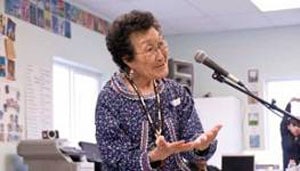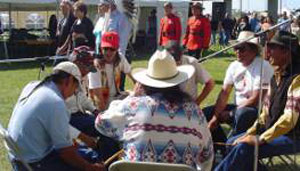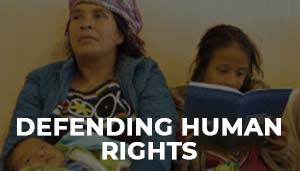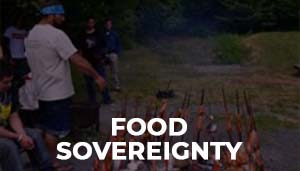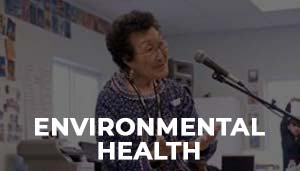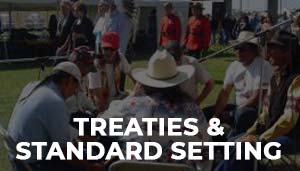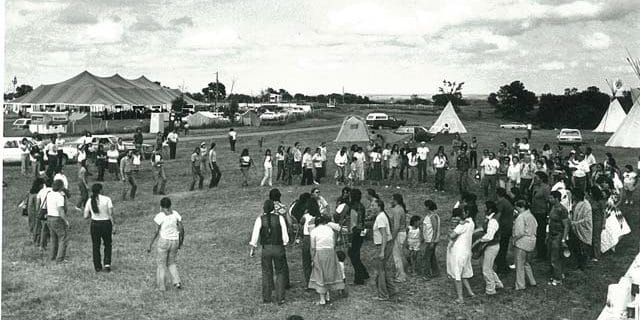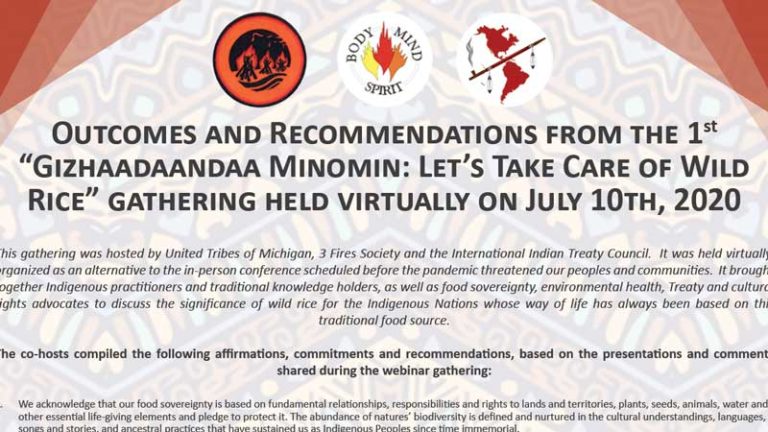

This gathering was hosted by United Tribes of Michigan, 3 Fires Society and the International Indian Treaty Council. It was held virtually, organized as an alternative to the in-person conference scheduled before the pandemic threatened our peoples and communities. It brought together Indigenous practitioners and traditional knowledge holders, as well as food sovereignty, environmental health, Treaty and cultural rights advocates to discuss the significance of wild rice for the Indigenous Nations whose way of life has always been based on this traditional food source.
The co-hosts compiled the following affirmations, commitments and recommendations, based on the presentations and comments shared during the webinar gathering:
- We acknowledge that our food sovereignty is based on fundamental relationships, responsibilities and rights to lands and territories, plants, seeds, animals, water and other essential life-giving elements and pledge to protect it. The abundance of natures’ biodiversity is defined and nurtured in the cultural understandings, languages, songs and stories, and ancestral practices that have sustained us as Indigenous Peoples since time immemorial.
- We, as Indigenous Peoples, assert our role as caretakers with rights and responsibilities to defend and ensure the protection, availability and purity of water, and sacred wild rice;
- We recognize the current threats to the survival of wild rice, our traditional sustaining “food that grows on the water”, including diminishing habitats, invasive species, climate change, patenting and genetic modification, extractive industries and urban and industrial pollution;
- We affirm and honor that harvesting, processing and preparing wild rice (minomin) traditionally involved the entire family. We recommit to supporting and revitalizing the participation of our youth and children in harvesting, processing and distributing the minomim, according to Anishinaabe traditional ways and practices;
- We reaffirm the Treaty rights to water and health, and stand united to follow and implement our knowledge and traditional laws, and exercise our right of self- determination to preserve water and to protect life;
- We make a call for support for the Annishinaabeg and other Indigenous Peoples’ efforts to stop genetic modification of sacred wild rice (minomim) in violation of Treaty, subsistence, cultural, spiritual and other rights;
- We recognize that genetic research in the form of modifying wild rice in such way that it harms the culture and traditions of the Anishinaabeg and other Indigenous Peoples must be halted and that the control of any protective research done on wild rice come within Anishinaabeg and Indigenous communities and that Tribal governments take actions to protect minomim from genetic modification;
- We recommend that the Tribal governments in our region denounce all forms of unsustainable energy development and the current practice of extreme energy development including fracking, strip and open pit mining and mountain top removal acknowledging the detrimental impacts on food sovereignty and subsistence, sacred areas and cultural practices, and health;
- We recommend that Tribal governments officially adopt the United Nations Declaration on the Rights of Indigenous Peoples, which affirms rights to our traditional lands, waters and other natural resources, cultural heritage include seeds and traditionally used plants and animals, a productive environment, subsistence rights, Treaties, self-determination, health and traditional health practices, Treaty rights and many other rights essential for our food sovereignty;
- We also call upon municipal, state and federal governments to uphold their obligations to honor and uphold their obligations in this regard, and in particular to respect, uphold and enforce their Nation to Nation Treaties with Indigenous Nations, including the provisions to respect our hunting, fishing and gathering rights.
- We recommend Tribal governments in the Great Lakes region follow the lead of Waganakising Odawa (Little Traverse Bay Bands of Odawa) and enact a statute similar to Prohibition on Patenting Organisms; and
- We recommend that Tribal governments seek reciprocity initiatives for fishing licenses between Tribes in Minnesota, Wisconsin and Michigan; acknowledging that we are all Anishinaabe and that the reservation boundaries create colonial barriers to our food sovereignty;
- We commit to continue these discussions at future gatherings and activities, in order to strengthen and reestablish our alliances, build mutual support to conform common threats, and share our knowledge as Wild Rice Peoples;
- We commit to make special efforts to include and build the participation of our youth in these gatherings and discussions, to share our knowledge with them to ensure the sustainability and vitality of our way of life into the future; we also commit to respect and encourage the participation of our upcoming and emerging young leaders, knowledge holders and practitioners, as they are our future; and
- Finally, we commit to continue gathering and sharing in order to defend, protect and use wild rice, protect its habitats, tell its stories, and transmit our relationship with this sacred source or life to new generation as an essential aspect of our health, resiliency and cultural identity as the Annishinaabeg Peoples.
Compiled by the hosts of the “Gizhaadaandaa Minomin: Let’s Take Care of Wild Rice” Gathering from comments and contributions made by presenters and participants on July 10º, 2020
Compartir esta publicación
Outcomes and Recommendations from the 1st “Gizhaadaandaa Minomin: Let’s Take Care of Wild Rice” gathering held virtually on July 10th, 2020

This gathering was hosted by United Tribes of Michigan, 3 Fires Society and the International Indian Treaty Council. It was held virtually, organized as an alternative to the in-person conference scheduled before the pandemic threatened our peoples and communities. It brought together Indigenous practitioners and traditional knowledge holders, as well as food sovereignty, environmental health, Treaty and cultural rights advocates to discuss the significance of wild rice for the Indigenous Nations whose way of life has always been based on this traditional food source.
The co-hosts compiled the following affirmations, commitments and recommendations, based on the presentations and comments shared during the webinar gathering:
- We acknowledge that our food sovereignty is based on fundamental relationships, responsibilities and rights to lands and territories, plants, seeds, animals, water and other essential life-giving elements and pledge to protect it. The abundance of natures’ biodiversity is defined and nurtured in the cultural understandings, languages, songs and stories, and ancestral practices that have sustained us as Indigenous Peoples since time immemorial.
- We, as Indigenous Peoples, assert our role as caretakers with rights and responsibilities to defend and ensure the protection, availability and purity of water, and sacred wild rice;
- We recognize the current threats to the survival of wild rice, our traditional sustaining “food that grows on the water”, including diminishing habitats, invasive species, climate change, patenting and genetic modification, extractive industries and urban and industrial pollution;
- We affirm and honor that harvesting, processing and preparing wild rice (minomin) traditionally involved the entire family. We recommit to supporting and revitalizing the participation of our youth and children in harvesting, processing and distributing the minomim, according to Anishinaabe traditional ways and practices;
- We reaffirm the Treaty rights to water and health, and stand united to follow and implement our knowledge and traditional laws, and exercise our right of self- determination to preserve water and to protect life;
- We make a call for support for the Annishinaabeg and other Indigenous Peoples’ efforts to stop genetic modification of sacred wild rice (minomim) in violation of Treaty, subsistence, cultural, spiritual and other rights;
- We recognize that genetic research in the form of modifying wild rice in such way that it harms the culture and traditions of the Anishinaabeg and other Indigenous Peoples must be halted and that the control of any protective research done on wild rice come within Anishinaabeg and Indigenous communities and that Tribal governments take actions to protect minomim from genetic modification;
- We recommend that the Tribal governments in our region denounce all forms of unsustainable energy development and the current practice of extreme energy development including fracking, strip and open pit mining and mountain top removal acknowledging the detrimental impacts on food sovereignty and subsistence, sacred areas and cultural practices, and health;
- We recommend that Tribal governments officially adopt the United Nations Declaration on the Rights of Indigenous Peoples, which affirms rights to our traditional lands, waters and other natural resources, cultural heritage include seeds and traditionally used plants and animals, a productive environment, subsistence rights, Treaties, self-determination, health and traditional health practices, Treaty rights and many other rights essential for our food sovereignty;
- We also call upon municipal, state and federal governments to uphold their obligations to honor and uphold their obligations in this regard, and in particular to respect, uphold and enforce their Nation to Nation Treaties with Indigenous Nations, including the provisions to respect our hunting, fishing and gathering rights.
- We recommend Tribal governments in the Great Lakes region follow the lead of Waganakising Odawa (Little Traverse Bay Bands of Odawa) and enact a statute similar to Prohibition on Patenting Organisms; and
- We recommend that Tribal governments seek reciprocity initiatives for fishing licenses between Tribes in Minnesota, Wisconsin and Michigan; acknowledging that we are all Anishinaabe and that the reservation boundaries create colonial barriers to our food sovereignty;
- We commit to continue these discussions at future gatherings and activities, in order to strengthen and reestablish our alliances, build mutual support to conform common threats, and share our knowledge as Wild Rice Peoples;
- We commit to make special efforts to include and build the participation of our youth in these gatherings and discussions, to share our knowledge with them to ensure the sustainability and vitality of our way of life into the future; we also commit to respect and encourage the participation of our upcoming and emerging young leaders, knowledge holders and practitioners, as they are our future; and
- Finally, we commit to continue gathering and sharing in order to defend, protect and use wild rice, protect its habitats, tell its stories, and transmit our relationship with this sacred source or life to new generation as an essential aspect of our health, resiliency and cultural identity as the Annishinaabeg Peoples.
Compiled by the hosts of the “Gizhaadaandaa Minomin: Let’s Take Care of Wild Rice” Gathering from comments and contributions made by presenters and participants on July 10º, 2020
